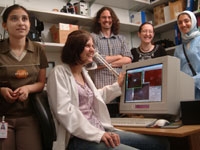The Medical College and Cornell University (Ithaca campus) were honored this summer by the presence of five energetic and ambitious Weill Cornell Medical College in Qatar (WCMC-Q) students. While the overall consensus revealed by these premedical students seemed to be "we are sick of all the attention," in reality, they responded with great humility and understanding to the interest expressed by faculty, staff and friends of the Cornell community.

From left: Kunali Dalal, Amila Husic, Dino Terzic, Vildana Omerovic, and Muna Al-Ali.
The attention they received was, to say the least, understandable. For one, WCMC-Q is the first medical school location established by an American university overseas. Its first class was inaugurated in October 2002 and began with a two-year, non-degree course of study to prepare students—a total of 25—for medical school. Three of those five students—Vildana Omerovic, Amila Husic and Kunali Dalal—studied in the research labs of Dr. David Hajjar, dean of Weill Cornell Graduate School of Medical Sciences and professor of biochemistry and structural biology; Dr. Timothy McGraw, associate professor of biochemistry and structural biology; and Dr. Manikkam Suthanthiran, the Stanton Griffis Distinguished Professor of Medicine, respectively, at Weill Cornell. Dino Terzic and Muna Al-Ali studied at Cornell (Ithaca).
One look at the Qatar students reveals a sense of shared camaraderie. As the writer and photographer met the five students in the lobby of Weill Cornell's main building, Kunali insisted on carrying one of the photographer's many bags, effectively breaking a brief moment of ice. Later, as the freelance photographer snapped away in the lab of Dr. McGraw, Vildana, with a cunningly mischievous smile, put two fingers behind Dino's head, a testament to her witty demeanor.
Dino, 21, who worked with Dr. Jun Kelly Liu, Cornell assistant professor of molecular biology and genetics, used his time while studying in Ithaca to "map a mutation of cells and determine the affected gene." But Dino wasn't about all work and no play. "The work in the lab was amazing, but I also got a chance to experience my surroundings, by hiking and enjoying the nature." Dino, who grew up in Bosnia and Herzegovina, and has spent the last couple of years in Qatar, added, "I almost feel disadvantaged in Qatar because we don't have the chance to experience the labs as much as we do here. I hope to continue more research in New York next summer."
Amila, a 19-year-old native of Bosnia, favored trips to Central Park and its summer program concerts. She also spent her summer "working with various DNAs, while those same DNAs affected the transport of glucose across the membrane of the cells."
And, the work has indeed been rigorous. So much, in fact, that Amila jokingly announced, "We have all decided to switch to academic fields."
When asked if they could change one thing about their experiences in New York, India-born Kunali said, "Three months is way too short. A lot of time is taken up getting settled in our labs. By next year, we want to be able to get straight to work. There are so many rules to learn about how to behave in a lab."
Evidently, this group of students has learned a lot, even the hidden code of survival for students pursuing medical professions.
"If you can't get fun on the outside, you have to make it for yourself on the inside," declared Vildana.
Dino agreed, adding, "We're all developing a weird sense of humor."
Amila shared, "I'm working way too much. I even wrote a paper the other day on why cells are better than people—so you know what state we are in!"
Vildana, Amila and Kunali said they enjoyed their time spent with the Medical College's namesakes, Joan and Sanford Weill. On July 7, the three students visited Citibank with Mr. Weill, chairman of the board and CEO at Citigroup Inc., who acted as their host. Mrs. Weill, chair of the board of the Alvin Ailey American Dance Foundation Inc. and co-chair of NewYork Weill Cornell Medical Center's Women's Health Symposium, treated these students to lunch and a tour of Lincoln Center on July 22, and other enjoyable activities.
If these homesick-yet-New-York-loving students (all of whom left New York for Qatar on Aug. 8) get their wishes granted, they'll be back next summer to continue significant research projects, and, of course, to have some fun.
(WCMC-Q offers a six-year program divided into a two-year non-degree premedical program, and a four-year medical program leading to a Cornell University medical degree (M.D.). Each program is based on the same admissions standards and curriculum as those of Cornell University, with teaching by Cornell faculty, and each has a separate admissions process.)
Photo by Amelia Panico.

